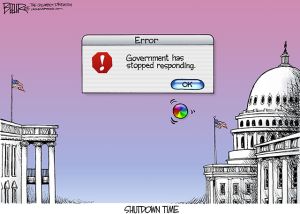It’s official. As of Tuesday night, the government has shutdown. And it is as serious as it sounds. Despite this fact, many still don’t know what the shutdown entails so here is a brief breakdown:
Each and every year, it is the responsibility of the Republican-controlled House and Democratic-led Senate to agree on and pass different bills to fund the federal agencies and set spending priorities. This happens every year and if they come to a stalemate, they usually will institute continuing resolutions, which keep the government funded until the next set decision deadline. However, this did not occur Monday night as the House instead passed its most recent proposal seeking again, to undermine The Affordable Care Act, otherwise known as Obamacare. The Senate once again rejected this and with little time for further deliberation, the deadline passed, therefore forcing the government to shutdown.
With the shutdown comes a multitude of consequences for the country and its people. Around 800,000 federal workers were sent home Tuesday as they are considered “non-essential” workers not needed at this time. There is also a chance that these people will not be paid for the time they will miss. The other “essential” workers, like air-traffic controllers, prison guards, border patrol agents, etc., will be forced to work without pay. They will not get paid until the Congress decides to fund the government again. Important congressional hearings planned during this time period have been postponed until further notice. National parks, museums and monuments are closed, losing substantial amounts of money daily in lost tourism. We face all these things and more.
The only agencies that remain open are those with independent sources of funding, including the U.S. Postal Service and the Federal Reserve. Other agencies’ activities are being halted due to the shutdown, such as the National Institutes of Health, the Department of Housing and Urban Development, the Justice Department, The National Park Service and more. Instrumental government functions are disabled during this time including legal immigration status checks on prospective employees, the suspension of civil cases and the provisional support for pregnant women and new moms.
Many of these agencies plan in their budgets for such a scenario, but since it is an uncommon and expensive alternative, many will not last for more than a week, if that.
So, with the details gone over, many of us begin to think how could the House and Senate let this happen? It’s actually fairly simple. Despite being the voice of the people, the strong opinions of opposing parties overwhelmed the knowledge that the people they were speaking for are now suffering because of a missed deadline.
While all of the people mentioned above go through the shutdown without pay, Congress is still compensated during this ordeal. It is difficult for us to imagine the people in Congress still deliberating over these issues despite the amount of time they’ve had to make these decisions and knowing that they are still being well paid while government workers who struggled before are now put into an even more debilitating situation.
It is somewhat childish even to consider the way this entire situation has been handled thus far. For years now the House and Senate have bumped heads on issues, waited till the deadline closed in and then one forced the other into a corner to make the decision before the shutdown limit. With an issue as large and controversial as Obamacare, it was bound to cause disagreements, but the Affordable Care Act isn’t brand new; President Obama has been behind it almost his entire presidency. No matter which side the decision fell to, it should have happened in the significant allotted time they were given and not spilled over into a period of shutdown. It’s truly impossible to say how long the discussions will take, but everyday that goes by costs this country millions of dollars and weakens the image of America. Obamacare is an extremely important issue and deserves a proper trial. At what cost does a lack of compromise mean for the well-being of a country?



